Interpretive Drums Design Soundtracks - Selection Page
| First-Year Engineering Student | Senior Engineering Student | Engineering Expert | |
|---|---|---|---|
| Low Performing | 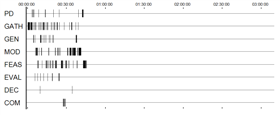 |
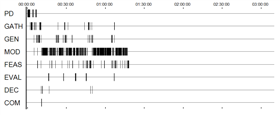 |
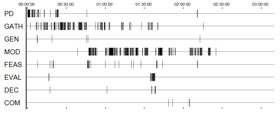 |
| Average Performing | 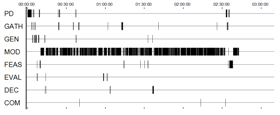 |
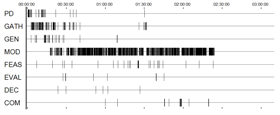 |
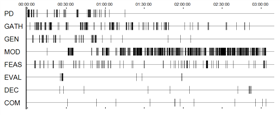 |
| High Performing | 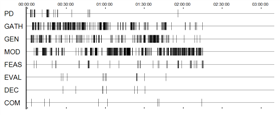 |
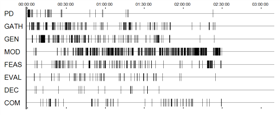 |
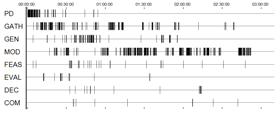 |
Sound Mapping
Unblock Flash widget to play samples
Soundtrack Version: Interpretive Drums
The Interpretive Drums design soundtracks were developed to apply the techniques of the Interpretive soundtracks to the Drums soundtracks.
Just as before, two approaches were used to highlight problem scoping: PD and GATH. Because the initial problem for the engineers was to design a playground, we used slightly pitched recordings from kids playing on a playground. We also added a volume envelope to emphasize early Problem Scoping activities. By this, we mean that we elevated the volume of any PD and GATH activities within the first 30 minutes of the transcript. The effect of this is that soundtracks without early problem scoping are notably softer.
The timbre of GEN, MOD, FEAS, and EVAL are also adjust similarly to before. In our implementation, the code keeps a running tally of percent of that activity completed and percent of total activities. So, for a timeline that is primarily MOD, the timbre (the amount of noise) associated with MOD increases greatly in comparison to the other activities. Whereas for someone whose design process involves a more even spead of activities, the sounds remain balanced timbrally. This time, however, the percussion sounds for these four activities are also accompanied by added reverb and noise. In the same way that activity sounds in the interpretive version changed to a rougher timbre as they dominated the design process, the sounds in this version gain a noticeable “whoosh” from the added reverberation and noise.
Finally, to highlight the seldom encountered activities of DEC and COM, the distinctive sound of cow bells was used in order to separate them from the percussive sounds of the other activities.
As with all design soundtracks, each activity is piped to either the right or left ear. This separation is noted in the sound samples table to the right.
